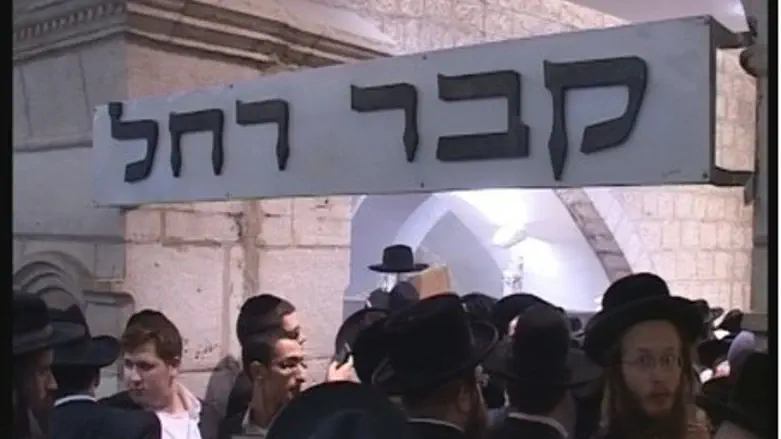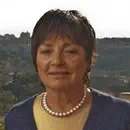
Tens of thousands of Jews are flocking to Rachel's Tomb on Monday night and are expected to continue to come to the site in large numbers throughout the day on Tuesday. The Egged bus company is running extra non-stop buses from Teddy's Stadium in southern Jerusalem and from the capital's religious neighborhoods to the tomb, working on an expanded schedule, as the area is closed to private vehicles.
Beginning Monday night and all day Tuesday is the 11th day of Cheshvan, the yahrzeit (anniversary of death) of the biblical Matriarch Rachel, whose tomb is located on the road from Bethlehem to Efrata, where she died, rather than in Hevron where the other three matriarchs are buried with their husbands.
The Jews prayed at her tomb on their way to the first exile in Babylonia after the Holy Temple's destruction in 586 BCE, so that the site symbolizes the pain of exile and the return from exile of the Jewish people. The prophet Jeremiah, in chapter 31, describes how Rachel's voice is heard weeping bitterly over the exile of her people and tells of G-d's promise to her that they will return one day.
Rachel was the Patriarch Jacob's beloved, but had to wait more than seven years to marry him and then stayed silent while her father saw to it that he wed her sister Leah first. While Leah had several sons, Rachel was barren for the first years of her marriage, and then died while giving birth to her second son Benjamin, so that she did not live to raise her children.
Women, especially, identify with her life story and have made the tomb a site to which they come all year to pray for their families. In the women's section, the wedding gown of Navah Appelbaum, murdered in Jerusalem by terrorists the night before her wedding, served for years as a curtain.
Rabbanit Tzvia Eliyahu, widow of the late Sephardic Chief Rabbi Mordecai Eliyahu, held a prayer evening in Rachel's memory for hundreds of women, at which she said a special prayer her husband had written for the freedom of Jonathan Pollard, whose 29th year of incarceration also begins on the date of Mother Rachel's yahrzeit.
Today, Rachel's Tomb is located within Bethlehem city limits, but is less than a kilometer south of the Jerusalem municipal border and is entered only from Jerusalem on a road protected by high concrete walls, so that visiting it is convenient and secure.
Recently renovated, the tomb has been recognized for more than 1700 years as that of the Matriarch Rachel, although there are some scholars who place it elsewhere. Slightly over a decade ago, Muslims began calling it the "Bilal bin Rabah Mosque", although none have been known to request to pray there throughout the 46 years since Israel's control of the site.
The constant presence of Jewish worshipers that fill the tomb's area all through the year did not stop UNESCO, the United Nations Educational, Scientific, and Cultural Organization from passing a resolution in 2010 stating that the Bilal bin Rabah Mosque/Rachel's Tomb [is] an integral part of the occupied Palestinian territories and that any unilateral action by the Israeli authorities is to be considered a violation of international law."
Israel's Prime Minister's Office responded that "the attempt to detach the Nation of Israel from its heritage is absurd,” adding that "it is sad that an organization that was established for the purpose of promoting the legacy of historic sites around the world tries, for political reasons, to uproot the ties between the People of Israel and their legacy. The State of Israel, as opposed to our neighbors, will continue to maintain freedom of worship for all religions in these sites."
Davidi Perl, head of the Gush Etzion Regional Authority, has issued an official request to the Ministers of Defense and the Interior, to the Deputy Minister of Religion and the Rabbi of the Kotel for Rachel's Tomb to be declared a part of Israeli Gush Etzion. He added that the tomb is now under IDF jurisdiction, but that even its optimum upkeep would be ensured if it were under Israeli civilian jurisdiction with the IDF responsible for security. .
